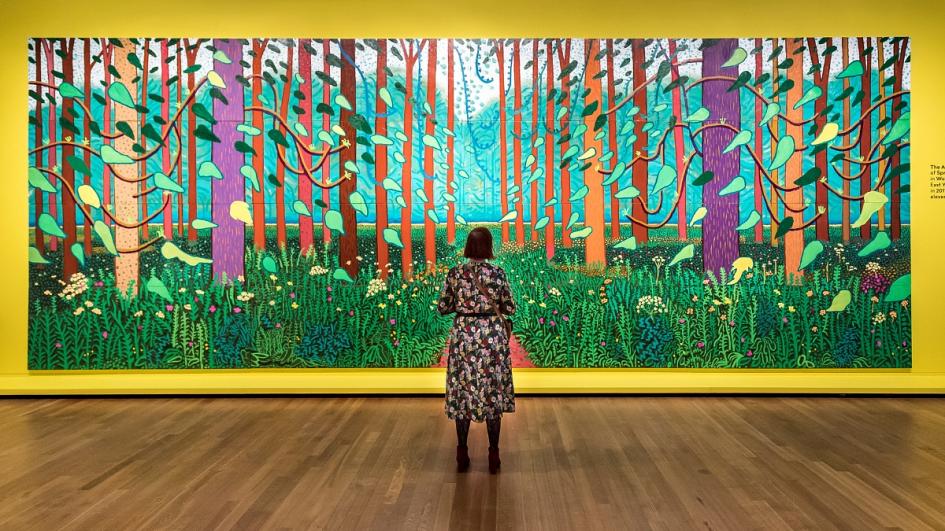Time travel

David Hockney, The Arrival of Spring in Woldgate
Having a crush is underrated, I think. I suppose I don’t know how having a crush is generally rated. Having a crush makes the moments between texts stretch out and this can be wonderful or terrible, but either way it does something to time, and I’ve always been obsessed with time travel.
I have a crush. Had a crush? On a person, but it wasn’t really about them.
I had a crush on a person I followed from Bangkok to Kuala Lumpur to Hong Kong six years ago, wandering cobblestone streets between ferns growing from the cracks of repainted walls as they told me about the meeting they’d had explaining social entrepreneurship to a manufacturing magnate in a skyscraper overlooking shimmering ships in Kowloon Bay. I can’t even remember their name, but I can’t ever smell the sizzle of rain on asphalt without thinking of them.
Sorry, that was a different person. The person I’m thinking about now is more like a fun house mirror for my sense of adventure, my boundless idealism, my limitless determination, my easy magnetism, my carefree selfishness.
They don’t have all those traits, of course. She had traces of some, and I filled in the rest.
Maybe the person I really have a crush on is my idealized self? That’s healthy! My younger self? Like I said, I’ve always been obsessed with time travel.
I’m being misleading. I don’t mean that I’m obsessed with traveling backwards or forwards in time. I don’t envy my younger self for being younger. I envy my younger self for having more time.
If you’re like me, every year of your life has felt shorter than the one before it. Realizing this when I was eleven resulted in a persistent fear that I would wake up one day to find that my life had passed by in a blur.
The most convincing explanation I’ve found for this is that new experiences heighten your senses, heightened senses create denser memories, and denser memories are interpreted by your brain as longer. The younger you are, the more new experiences you have — first day of school, first concert, first kiss — so your earlier years feel much longer when you’re looking back.
Sixteen hundred years ago, St Augustine observed that our perception of time and our memory of time are two different things. When someone says “time flies when you’re having fun,” they’re talking about perception, not memory.
When you’re having fun, you perceive time as short but remember it as long.
When you’re bored, you perceive time as long but remember it as short.
I read somewhere that time feels shorter the older we get because we’re less bored the older we get. This feels personally true because thanks to my phone, I haven’t been bored since 2013, but I guess I’m looking for an explanation that’s a little more… Timeless.
The good news is that younger and older people perceive time with only minor differences. You can test this by asking people to guess when a minute has passed without counting. Younger people can do this quite well, while older people tend to slightly overestimate, but the results are pretty similar (when I did this I guessed that a minute had passed after only 35 seconds).
So every year feels shorter than the one before it looking back, but I find the evidence pretty convincing that this is an illusion and my perception hasn’t really changed that much.
Ways to time travel make time feel longer:
Live in fear
People have done experiments exposing arachnophobes to spiders and asking them to estimate how much time had passed afterwards. The arachnophobes consistently overestimated, which is not that surprising to me, but also not that helpful. I could scare myself every morning to make the day feel longer, but keeping myself in a state of maximized threat perception seems like it would shorten my life in other ways.
Do new things
Doing new things has been my default solution to the time travel problem. But I find it hard to do new things after I’ve been living in one place for a while. Life spent in one place accumulates commitments, rituals, patterns of thought. Rehearsals on Mondays and Thursdays, happy hours on Fridays, farmers’ markets on Saturdays, PianoFight, Drake’s Dealership, Local Edition, Señor Sisig, Arsicault, Blue Bottle, DNA Lounge, Dolores Park, Bernal Heights, Lake Merritt, trivia nights, competition weekends, birthday parties, dinner parties, relationships, freestyle sessions, hikes, protests, brunch.
Running away and starting over is a form of time travel. I felt liberated when I first got to Austin. I had no obligations, and my time was entirely in my own hands.
I wanted to climb, so I did. I wanted to work out every day, so I did. I wanted to write more, watch less YouTube, read more books, volunteer, practice card tricks, dance to Christmas music in February, so I did.
The problem with this solution — for me anyway — is that it’s never been sustainable. By my third week in Austin, work got busy again and a month passed in a blur. At this point, I’ve run away and started over six times in my adult life: Columbus, Chicago, San Francisco, Kuala Lumpur, San Francisco again, Austin.
It’s not that I’m tired of making new friends. I just miss having old ones around.
Do drugs
The research here is very incomplete (unfortunately true for many potentially life-changing substances) but it seems like at low doses, stimulants and hallucinogens result in overestimates of duration, while depressants and anesthetics result in underestimates.
The drugs themselves, of course, offer opportunities for new “firsts” in adulthood but ultimately face the same sustainability problems as other new experiences. What I’ve heard about microdosing sounds promising, but I don’t know enough about it… Yet.
Experience art
Jenny Odell wrote about how art can influence attention in How to Do Nothing. Pieces like David Hockney’s Seven Yorkshire Landscapes (a hallucinatory collage of images from misaligned cameras mounted to a moving car) and John Cage’s 4’33” (in which a pianist plays nothing and the ambient sound — coughs, uncomfortable laughter, chair scrapes — make up the piece) can train audiences to see and hear the world with new clarity. After experiencing 4’33”, Odell wrote that she was a different person for months.
I love the thought that art could have a role to play in my life beyond aesthetic appreciation. Is that horrifyingly utilitarian? It wouldn’t be the first time, and it won’t be the last.
Have a crush
If you thought my view of art was cynical, wait until you hear me talk about crushes.
I read an essay by a woman who was trying to stop using people as drugs. She wrote, “If I could be eternally and omnipotently texted, I might not have had to quit the drug-person. But no one can text you infinitely. So every day became a cycle of getting high and getting well.”
Here lies Ian. He only allowed himself to love when it was convenient for his perception of time.
Do you think about this a lot? Let me know. I think about this literally all the time.
